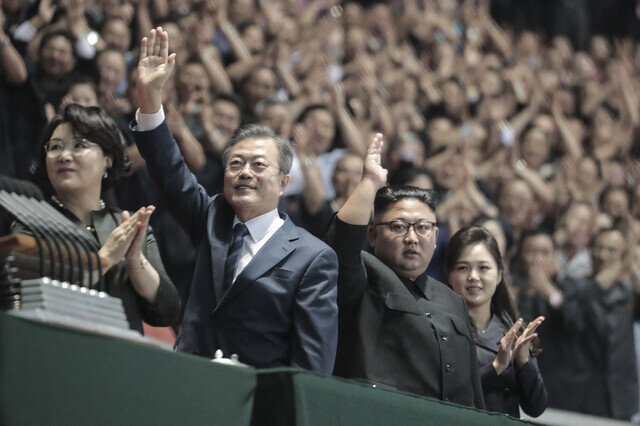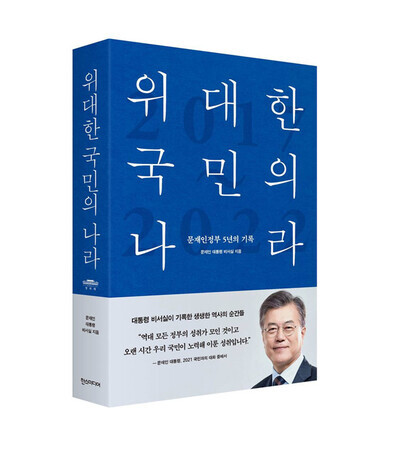hankyoreh
Links to other country sites 다른 나라 사이트 링크
A behind-the-scenes look at Moon’s 5 years in office, from inter-Korean peace talks to real estate woes

“At first, North Korea intended the format of the speech [at the Rungrado 1st of May Stadium] to be a simple greeting to the citizens of Pyongyang, but we suggested holding a live broadcast and making it an official address. This time, it was North Korea that seemed a little flustered.” (Youn Kun-young, former director of the Blue House office of state affairs planning and monitoring).
“I remember it was around 3 am on the morning of Sept.14. There were [already] over 30 documents related to the military agreement, but around 2 am, the North said, ‘Let’s go back to the drawing board.’ We then suggested pushing through to the end instead, and if it doesn't work then, to withdraw. I don’t know what message they must have received, but the North shifted its stance to accept most of the issues between the two sides. I thought to myself, ‘North Korea really did have the determination [to sign a deal].” (Choi Jong-kun, former presidential secretary for peace and arms control).
These stories took place during the short spring thaw of the Cold War that the Korean Peninsula experienced in the wake of President Moon Jae-in’s September 2018 address in Pyongyang and the subsequent dismantlement of guard posts on the Demilitarized Zone.
A book detailing the behind-the-scenes process of this period has recently hit shelves. Titled “The Great Country of the People,” the book contains interviews with 41 officials, including 13 current and former officials who worked in the Office of the President under Moon.
Push and pull inter-Korean peace processIn the book, Youn Kun-young, who previously served as director of the Blue House office of state affairs planning and monitoring and currently serves in the National Assembly, reveals never-before-told details of the negotiations between the two Koreas that took place regarding Moon’s 2018 speech in North Korea.
Youn says there were “a lot of concerns about the plan itself.”
“The speech was supposed to be given ahead of this mass play called ‘The Glorious Motherland’ boasted by North Korea. North Korea was using this performance into propaganda for the regime, and there were topics that could be sensitive, domestically speaking,” he says.
“But instead, the president said that we should go out there boldly,” Youn says, adding that Moon argued there was no need to take a defensive position since South Korea is far “superior" and “confident.”
After the South Koreans came to the negotiation table with that in mind, North Korea said it would revise any sensitive parts of the speech.
“After many twists and turns, the schedule was finalized,” Youn says.
Moreover, Choi Jong-kun, a former secretary to the president for peace and arms control and the current first vice minister of foreign affairs, conveys the push-and-pull bargaining process leading up to the Sept. 19 inter-Korean military agreement.
“One of the things the North said was ‘If I go back to Pyongyang as is, I’d be seen as a surrenderer.’ This shows that the North was also internally putting significant effort into reaching a consensus,” Choi says.
“The will of the supreme leader of North Korea is important, but how much of that will is materialized [. . .] through internal military consultations is another matter,” Choi adds.

The book also includes reflections on the Moon administration’s real estate policies. Calling the painful real estate issue a “wake-up call,” it acknowledges mistakes were made, stating that “the results of the policy did not meet expectations” and that the president had apologized multiple times to the Korean people for these failures.
“[We were] unable to tame the buying craze that hit the real estate market, and, while watching prices soar, the young generation had to either put everything down to their soul on the line for a loan to buy [a home] or give up,” the book reads. The text notes the Moon administration’s “remorse for being unable to carry out a task so crucial to the livelihood of the people.”
Additionally, a system in which individual landlords could register their property as a business promoted under Moon was seen by many as a tax loophole, and was criticized as exacerbating housing unavailability and rising home prices. To this point, the book states that the Moon administration “faced criticism for lack of policy consistency and undermining public trust.”
Regarding the so-called “Three Laws on Rent and Lease” that President-elect Yoon Suk-yeol said his administration would revise, the book states that the system was initially introduced to “stabilize” the living situation for renters.
“Although some confusion occurred at the beginning of the introduction of the system, it is still necessary to continuously review the necessity of supplementation as the system is still in the early stages of implementation,” the book states.
In particular, an interview with the former Minister of Land, Infrastructure and Transport Byeon Chang-heum notes that the Blue House found it painful to lose the public’s trust regarding real estate policy.
“Restoring trust in housing policies was important, but in the end, it is regrettable that public trust has instead fallen due to me, the Ministry of Land, Infrastructure and Transport, and the institution [Korea Land & Housing Corporation] I headed,” Byeon states.
“If you’re not going to pay attention to what’s happening on the ground, at least watch the news”In addition, scenes of Moon’s exasperation during the mask shortage Korea faced early in the COVID-19 pandemic are included in the book. In a closed-door meeting, Moon reportedly expressed his deep frustration with the situation.
“How long are you going to act like this, unable to solve this one [issue of] masks? What’s the problem here?” Moon reportedly asked his aides. “I hear you don’t watch the news, but if you’re not going to pay attention to what’s happening on the ground, at least watch the news,” Moon said, imploring his aides to understand what Koreans were facing.
In response to this, Moon’s Chief of Staff Noh Young-min summoned national policy advisor Kim Sang-jo, and launched the so-called “Red Sea Project” to supply 20 million masks a day. In the book, it’s revealed that the Blue House chose this name because of the “pressing need for an Exodus-level miracle.” It marked the start of its full-on efforts to ensure Koreans had access to masks.
The book also makes mention of Moon’s trips overseas. Park Yong-maan, the former chairman of the Korea Chamber of Commerce and Industry, refutes the claim that Moon ordered businesspeople around to join him on these trips.
“Nowadays, the chairmen of large corporations are not at [the president’s] disposal,” Park said.
“I have traveled a lot with presidents of previous administrations too, but I was never able to do any real sightseeing,” Park says. “The president doesn’t bring busy people along to just have a good time.”
However, regarding his experiences on foreign trips with the president, Park says that, compared to previous administrations, the atmosphere is much less rigid. “In the past, when the president walked by, everyone froze. These days, people just take pictures comfortably and feel freer,” Park said.
By Lee Wan, staff reporter
Please direct questions or comments to [english@hani.co.kr]

Editorial・opinion
![[Editorial] Intensifying US-China rivalry means Seoul must address uncertainty with Beijing sooner than later [Editorial] Intensifying US-China rivalry means Seoul must address uncertainty with Beijing sooner than later](https://flexible.img.hani.co.kr/flexible/normal/500/300/imgdb/original/2024/0517/8117159322045222.jpg) [Editorial] Intensifying US-China rivalry means Seoul must address uncertainty with Beijing sooner than later
[Editorial] Intensifying US-China rivalry means Seoul must address uncertainty with Beijing sooner than later![[Column] When ‘fairness’ means hate and violence [Column] When ‘fairness’ means hate and violence](https://flexible.img.hani.co.kr/flexible/normal/500/300/imgdb/original/2024/0516/7417158465908824.jpg) [Column] When ‘fairness’ means hate and violence
[Column] When ‘fairness’ means hate and violence- [Editorial] Yoon must stop abusing authority to shield himself from investigation
- [Column] US troop withdrawal from Korea could be the Acheson Line all over
- [Column] How to win back readers who’ve turned to YouTube for news
- [Column] Welcome to the president’s pity party
- [Editorial] Korea must respond firmly to Japan’s attempt to usurp Line
- [Editorial] Transfers of prosecutors investigating Korea’s first lady send chilling message
- [Column] Will Seoul’s ties with Moscow really recover on their own?
- [Column] Samsung’s ‘lost decade’ and Lee Jae-yong’s mismatched chopsticks
Most viewed articles
- 1[Editorial] Transfers of prosecutors investigating Korea’s first lady send chilling message
- 2Celine Song says she’s gratified global audiences have responded to the kismet of ‘inyeon’
- 3[Exclusive] Unearthed memo suggests Gwangju Uprising missing may have been cremated
- 4For new generation of Chinese artists, discontent is disobedience
- 5[Column] US troop withdrawal from Korea could be the Acheson Line all over
- 6Could Korea’s Naver lose control of Line to Japan?
- 7Xi, Putin ‘oppose acts of military intimidation’ against N. Korea by US in joint statement
- 8Yoon ridicules critics of Fukushima dumping in first comments since release began
- 9Five Ukrainians share how their lives have changed two years into war
- 10[Editorial] Intensifying US-China rivalry means Seoul must address uncertainty with Beijing sooner t